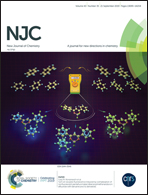Suppression of platinum sintering on Pt–M/ZSM-22 (M = Ce, La, and Re) catalyst for n-dodecane isomerization†
Abstract
Small Pt particles (about 1.2 nm) were highly dispersed on ZSM-22 zeolites via a strong electrostatic adsorption (SEA) method and exhibited a promotion effect on the catalytic performance in n-dodecane isomerization in comparison with the conventional catalyst. Several promoters (Ce, La, and Re) were introduced to further improve the aggregation resistance of the small Pt particles. A series of characterization including H2-TPR, XPS and STEM as well as DFT calculations provided solid evidence that the strong interaction between Pt and promoter species not only effectively hinders the Pt aggregation but also alters the electronic state of the Pt sites. Moreover, Ce and La promoters also lead to a slightly improved amount of B acid sites determined by Py-FTIR. Thus, improved activity and selectivity were achieved on a Ce-modified catalyst due to the better balanced bifunctionality between the slightly increased acidity of zeolites and electron-deficiency of Pt. The electron-rich Pt sites are responsible for the significant increase of CH4 selectivity and the decrease of total isomer selectivity in n-dodecane isomerization. In addition, a high-temperature reduction test revealed the higher isomerization activity and selectivity (about 10% higher than the unmodified catalyst) of the Ce-modified catalyst owing to the strong bond of Pt–O–Ce, further confirming the positive effect of the Ce promoter on the sintering resistance of small Pt particles.



 Please wait while we load your content...
Please wait while we load your content...